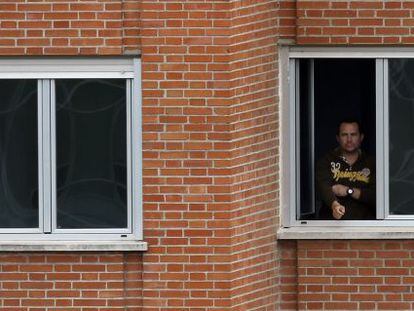Ebola victim able to drink liquids; has spoken to husband by phone
Teresa Romero’s condition has improved but relatives warn she could still have a relapse


Teresa Romero, the nursing assistant who contracted Ebola after treating a patient with the virus at a Madrid hospital, is back on a liquid diet and has been able to talk to her husband on the phone, a family friend told the press on Wednesday.
While Romero still “doesn’t remember a lot of things” and is still in a serious condition, her team of doctors are “hopeful” and there is a feeling of “optimism regarding her chances of overcoming the disease,” said Teresa Mesa, a friend who is acting as a spokesperson for the family.
On Wednesday morning, Health Minister Ana Mato said that Romero was still in a stable but serious condition.
The nursing assistant is being treated at Carlos III Hospital, the same center where she worked and came into contact with two Spanish missionaries who were brought back for treatment after they contracted Ebola in West Africa.
One of Romero’s cousins explained that “she is already getting up and sitting down, drinking liquids and showing energy,” according to the report sent by the hospital to Romero’s mother, who lives in the Galician town of Becerreá.
The cousin said that “just getting here is quite a triumph,” and that “the most critical days are behind us.” But she also warned that Teresa remains in serious condition and could have a relapse.
The government committee created to deal with the Ebola crisis issued a press release to the effect that the 15 people who are in hospital preventively have not shown any symptoms of the disease. All of them were in contact with Romero during the days prior to her admission at Carlos III.
The committee also noted the added difficulty for the medical team of working with the blinds down to protect their patient’s privacy. One of her doctors, Fernando de la Calle, complained about it on Tuesday.
“She should be able to see daylight,” he said, calling the current situation “detrimental to her treatment.”
Romero has not yet been informed of the fate of her pet dog Excalibur, who, despite protests from the public and her husband, Javier Limón, was put down by Madrid authorities given the risk that he may have been infected with the Ebola virus.
Carlos III Hospital expands Ebola-ready facilities
Madrid's Carlos III Hospital has undertaken emergency renovation work on the floor where the nursing assistant with Ebola is being treated. Construction workers are racing against the clock to turn four other rooms on the sixth floor into special, isolated units with "airlocks" where workers can safely remove their protective suits.











































